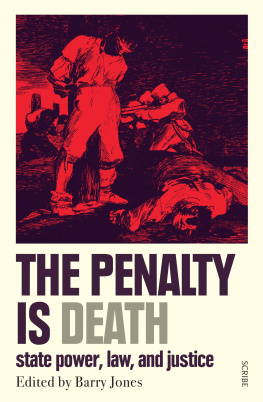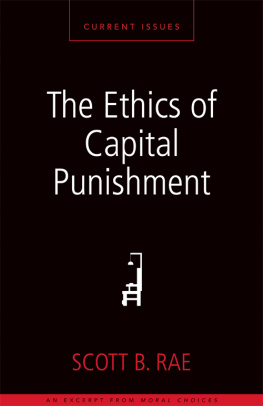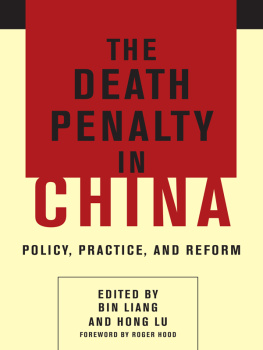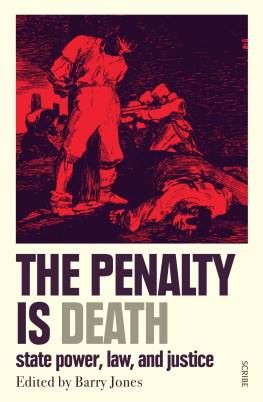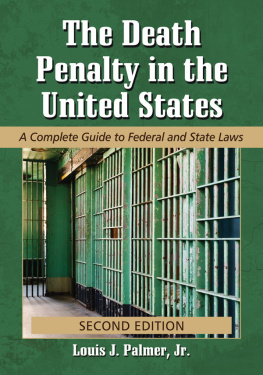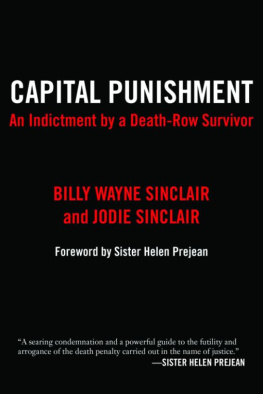Questioning Capital Punishment
The death penalty has inspired controversy for centuries. Raising questions regarding capital punishment rather than answering them, Questioning Capital Punishment offers the footing needed to allow for more informed consideration and analysis of these controversies. Acker edits judicial decisions that have addressed constitutional challenges to capital punishment and its administration in the United States and uses complementary materials to offer historical, empirical, and normative perspectives about death penalty policies and practices. This book is ideal for upper-level undergraduate and graduate classes in criminal justice.
James R. Acker is a Distinguished Teaching Professor in the School of Criminal Justice at the University at Albany. He received his JD at Duke University and his PhD in criminal justice at the University at Albany. He has edited several books and authored numerous scholarly articles that focus on legal and empirical aspects of capital punishment. In 2005, Acker helped establish the National Death Penalty Archive at the University at Albany, a repository that houses one of the largest and most significant collections of historical materials relating to the death penalty in the United States. His other academic interests include the integration of social science into law, legal doctrine relating to criminal procedure, criminal law, and juvenile justice, and issues pertaining to miscarriages of justice.
Criminology and Justice Studies Series
Edited by Shaun L. Gabbidon, Penn State Harrisburg
Criminology and Justice Studies offers works that make both intellectual and stylistic innovations in the study of crime and criminal justice. The goal of the series is to publish works that model the best scholarship and thinking in the criminology and criminal justice field today, but in a style that connects that scholarship to a wider audience including advanced undergraduates, graduate students, and the general public. The works in this series help fill the gap between academic monographs and encyclopedic textbooks by making innovative scholarship accessible to a large audience without the superficiality of many texts.
Books in the Series
Published:
Biosocial Criminology: New Directions in Theory and Research
Edited by Anthony Walsh and Kevin M. Beaver
Community Policing in America
Jeremy M. Wilson
Criminal Justice Theory: Explaining the Nature and Behavior of Criminal Justice
Edited by David E. Duffee and Edward R. Maguire
Lifers: Seeking Redemption in Prison
John Irwin
Race, Law and American Society: 1607 to Present
Gloria J. Browne-Marshall
Todays White Collar Crime
Hank J. Brightman
White Collar Crime: Opportunity Perspectives
Michael Benson and Sally Simpson
The New Criminal Justice: American Communities and the Changing World of Crime Control
John Klofas, Natalie Hipple, and Edmund McGarrell
The Policing of Terrorism: Organizational and Global Perspectives
Mathieu Deflem
Criminological Perspectives in Race and Crime, 2/e
Shaun Gabbidon
Corrections
Jeanne Stinchcomb
Community Policing
Michael Palmiotto
A Theory of African American Offending
James Unnever and Shaun Gabbidon
When Crime Appears: The Role of Emergence
Jean McGloin, Christopher Sullivan, and Leslie Kennedy
Voices from Criminal Justice
Edited by Heith Copes and Mark Pogrebin
Crime and the Life Course, 2/e
Michael Benson
Wrongful Convictions and Miscarriages of Justice
Edited by C. Ron Huff and Martin Killias
Human Trafficking: Interdisciplinary Perspectives
Edited by Mary C. Burke
Race, Law and American Society, 2/e: 1607 to Present
Gloria J. Browne-Marshall
Research Methods in Crime and Justice
Brian Withrow
Crime and Networks
Edited by Carlo Morselli
Wrongful Conviction and Criminal Justice Reform
Edited by Marvin Zalman and Julia Carrano
Questioning Capital Punishment: Law, Policy, and Practice
James R. Acker
Titles of Related Interest
Due Process Denied: Detentions and Deportations in the United States
Tanya Golash-Boza
Torture: A Sociology of Violence and Human Rights
Lisa Hajjar
Beyond the Prison Industrial Complex: Crime and Incarceration in the 21st Century
Kevin Wehr and Elyshia Aseltine
From Trafficking to Terror: Constructing a Global Social Problem
Pardis Mahdavi
The Pains of Mass Imprisonment
Benjamin Fleury-Steiner and Jamie Longazel
Reviews for Questioning Capital Punishment:
This is a remarkable book by a renowned teacher and scholar. It tells about Americas return to capital punishment after it was outlawed in 1972. The story is keyed to the twists and turns in the thinking and writing of Supreme Court Justices whose decisions have determined the fate of thousands of convicted murderers. And it is timely because the future of the death penalty appears to be moving from the hands of the High Court to those of the people like you and me. In the past dozen years six states have abandoned the death penalty and the pace appears to be picking up.
William Bowers, Director of the Capital Jury Project
Questioning Capital Punishment offers an outstanding, comprehensive overview of one of our most enduring legal controversies, the death penalty. In clear and engaging prose, Acker first delineates the justifications for and against this most extreme punishment, then illustrates the many challenges in its application, including its legal complexity and the threats it poses to justice and fairness in its administration. This is an essential text for students and others interested in learning more about the contemporary American capital punishment system.
Mona Lynch, School of Social Ecology, University of California, Irvine
Balanced, thoughtful and thought-provoking, this fine text is a well-written and highly engaging tour of the main ways we should examine capital punishment when we think carefully about our ultimate penal sanction.
Robert Johnson, Justice, Law, and Criminology, American University, author of Condemned to Die and Death Work.
Questioning Capital Punishment offers a thoughtful and well-edited compendium of materials and commentary that introduce the difficult moral and policy issues surrounding capital punishment and explain the complex constitutional doctrines and legal institutions that shape the imposition of the death penalty in the United States today. In the rapidly changing political and legal landscape around capital punishment, this volume offers up-to-the-minute materials and fair-minded questions to counter the partisan bromides that often dominate the conversation. A terrific introduction to a timely and important issue.
Carol Steiker, Harvard Law School
Full of fascinating details, this book raises important, thought provoking questions about the ultimate penalty. It is an eloquent, well documented exploration of a wide range of issues interspersing the authors own cogent discussion with quotes from landmark court cases and recognized social scientists and legal philosophers.
Wanda D. Foglia, Law and Justice Studies, Rowan University


